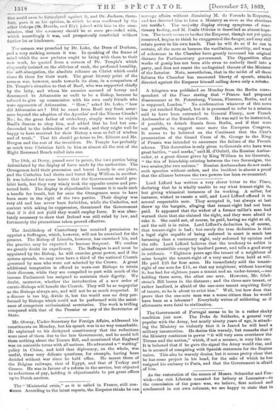Lord Lifford has written a very clever letter to the
Times, declaring that he is wholly unable to say what tenant-right is, but giving whimsical instances of its working. A miller, for instance, wished to vacate a mill, and Lord Lifford offered it to several respectable men. They accepted it, but always at last threw up the bargain, alleging that tenant-right had not been paid. It appeared that the widow of a former miller's man had warned them that she claimed the right, and they were afraid to take it. She could not, of course, be paid, having no right at all, and the mill is in ruins. Lord Lifford's deduction is, of course, that tenant-right is bad ; but surely the true deduction is that a legal right capable of being enforced in court is much less harassing than a customary right, only enforced by opinion and the rifle. Lord Lifford believes that the tendency to sublet is almost irresistible except by landlord power, and tells a good story in evidence. " Eighteen years ago the tenant of a neighbour of mine bought the tenant-right of a very small farm held at will. He paid £25 for four acres. He immediately sold the tenant- right of one acre for £15, so that my neighbour, without knowing it, has had for eighteen years a tenant and an under-tenant,—oue holding three acres, the other one acre. However, Mr. Glad- stone's Bill looms in the distance ; and the three-acre tenant, or rather landlord, is afraid of the one-acre tenant acquiring fixity of tenure, so he is about to evict him." Well, but how does that prove that the one-acre man was a worse citizen than he would have been as a labourer? Everybody writes of subletting as if allotments were fatal to civilization.


































 Previous page
Previous page